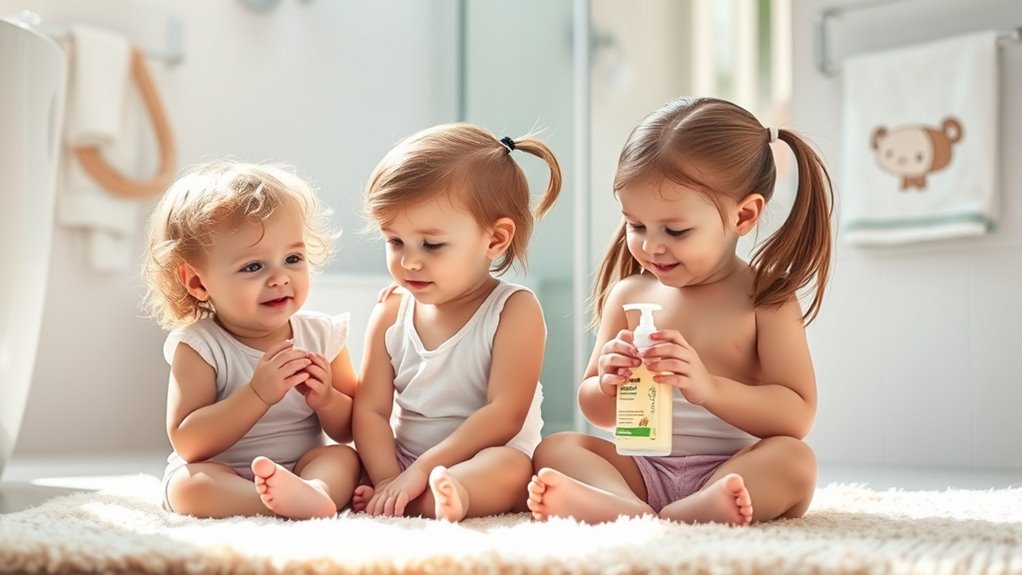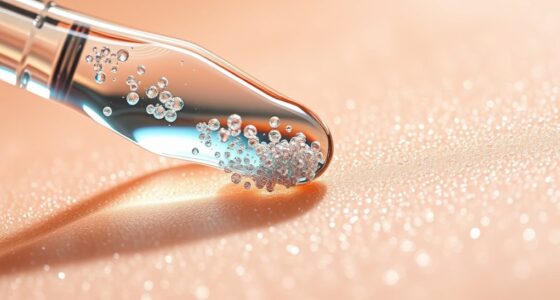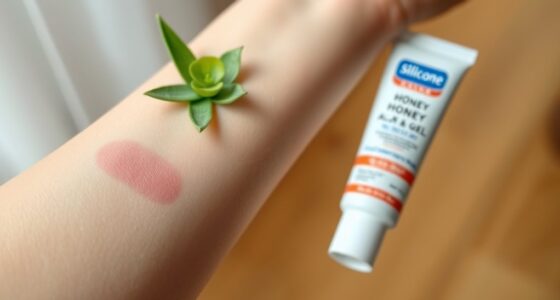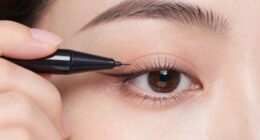To teach kids healthy skincare habits, involve them in choosing fun sunscreens and protective gear, making sun safety a daily routine beyond sunny days. Use gentle cleansers and teach them to wash twice a day, emphasizing the importance of cleanliness and hydration. Make routines engaging and consistent to build lifelong habits that protect their skin from damage, irritation, and dryness. Keep exploring ways to foster positive habits that can last a lifetime.
Key Takeaways
- Involve children in choosing and applying sunscreen to make it a fun, engaging routine.
- Teach the importance of wearing protective clothing, hats, and sunglasses during sun exposure.
- Establish consistent cleansing routines using gentle, fragrance-free products suitable for delicate skin.
- Reinforce the benefits of regular handwashing and face cleansing to prevent skin issues.
- Educate children early on the lifelong benefits of maintaining healthy skincare habits for overall skin health.
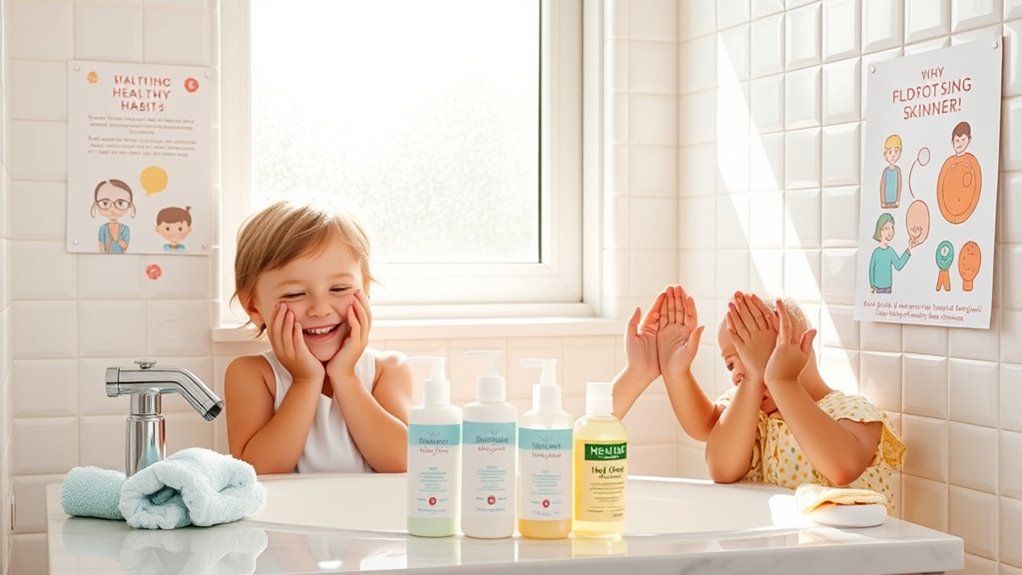
Have you ever wondered how to keep your child’s skin healthy and protected? Teaching your kids good skincare habits from an early age is essential for their overall health and confidence. A key part of this is ensuring they understand the importance of sun protection and gentle cleansing. Kids are naturally energetic and curious, which means their skin is often exposed to the sun, dirt, and other environmental factors. By establishing simple routines, you can help them develop habits that will serve them well for a lifetime.
Sun protection should be a non-negotiable part of your child’s daily routine. You want to teach them to wear broad-spectrum sunscreen every time they go outside, even on cloudy days. Apply it generously to all exposed skin, and make it a fun activity by involving your child in choosing their favorite sunscreen or applying it together. Remember, kids often forget to reapply sunscreen, so set reminders or make it a part of their after-swim or outdoor activity routine. Help them understand that protecting their skin from harmful UV rays not only prevents sunburns but also reduces the risk of skin damage and aging later in life. Wearing protective clothing, hats, and sunglasses is equally important, especially during peak sun hours. By instilling these habits early, your child learns that sun protection isn’t just a summer thing but a year-round responsibility.
Gentle cleansing is equally crucial in caring for your child’s delicate skin. Kids’ skin is more sensitive than adults’, so using mild, fragrance-free cleansers helps prevent irritation and dryness. Show your child how to wash their face and body gently, using lukewarm water and soft cloths or hands. Explain that scrubbing too hard can harm their skin and cause redness or discomfort. Make cleansing a positive experience by teaching them to wash away dirt and sweat after playing outside, but emphasize that less is more—over-washing can strip natural oils and lead to dryness. Encourage them to develop a routine of washing their face twice a day, morning and night, to keep their skin fresh and free of pollutants. Additionally, teach them to pat their skin dry rather than rubbing, to avoid irritation. Using a moisturizer suitable for kids after cleansing can help keep their skin hydrated, especially during colder months or in dry environments.
Frequently Asked Questions
When Should I Start Using Sunscreen on My Child’s Skin?
You should start using sunscreen on your child’s skin as early as six months old. Apply sunscreen during sun protection timing whenever your child is outdoors, especially between 10 a.m. and 4 p.m. when the sun’s rays are strongest. Make sunscreen application a daily habit, even on cloudy days, to protect their delicate skin from UV damage. Consistent sun protection helps instill healthy habits early on.
How Can I Tell if My Child’s Skin Is Too Sensitive?
You can tell if your child’s skin is too sensitive by observing skin sensitivity indicators like redness, itching, or irritation after using products or exposure to the sun. If these signs appear frequently, consider allergy testing to identify specific triggers. Pay close attention during new skincare routines, and consult a pediatrician if reactions persist. This helps you protect your child’s delicate skin and choose suitable, gentle products.
Are Natural or Organic Skincare Products Better for Kids?
Natural and organic skincare products are generally better for kids because they use natural ingredients and chemical-free formulations, reducing the risk of irritation. You should look for products labeled as organic or natural, and check for gentle, safe ingredients. These options tend to be gentler on sensitive skin, and they help teach your child healthy habits from a young age. Always do a patch test before full use to guarantee compatibility.
How Often Should Kids Wash Their Face and Body?
Think of your child’s skin as a garden that needs gentle tending. You should encourage face cleansing twice daily—morning and night—to remove dirt and oil. Body washing can be done daily or every other day, depending on activity levels and skin sensitivity. Using mild, kid-friendly products, you help keep their skin fresh and healthy, just like watering a garden guarantees vibrant blooms.
What Are Signs of Skin Irritation or Allergic Reactions in Children?
You should watch for rash symptoms like redness, swelling, or bumps, which can signal skin irritation or allergy indicators. If your child complains of itching, burning, or experiences swelling around the eyes or lips, these are signs of potential allergic reactions. Keep an eye on any persistent or worsening symptoms, and consult a healthcare professional if you notice rash symptoms or allergy indicators, to make certain of proper care and relief.
Conclusion
By teaching your kids good skincare habits early on, you’re setting them up for healthier skin in the future. Did you know that 80% of skin damage occurs before age 20? That’s why establishing routines now is so important. Keep it simple, make it fun, and lead by example. Your guidance helps your children develop lifelong habits that protect their skin and boost their confidence as they grow. Start today for a brighter, healthier tomorrow.
